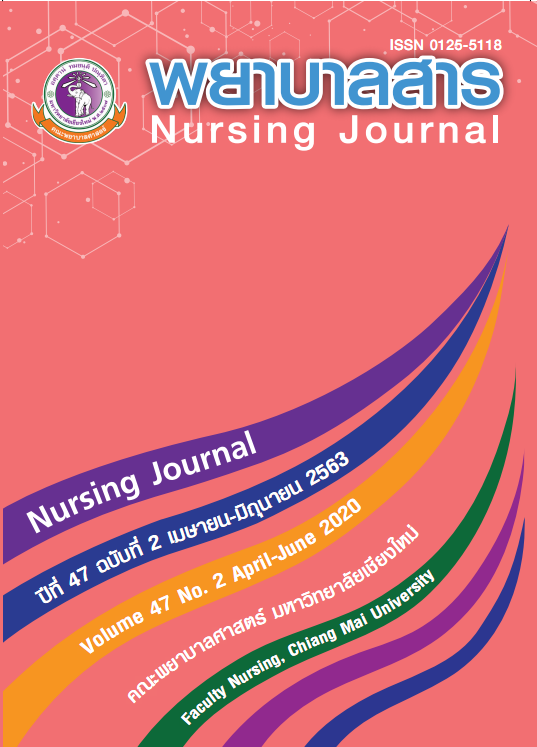Factors Related to Fatigue Among Fathers in Postnatal Period
Keywords:
Fatigue, Fathers in Postnatal PeriodAbstract
Fatigue is the perception and feeling which can be found among fathers in the postnatal period. It affects fathers physically and mentally. The purpose of this descriptive correlational research was to explore the relationship between the perception of infant’s communicated behavior, social support and fatigue among fathers in postnatal period. The subjects were selected following inclusion criteria and consisted of 85 fathers in postnatal period, who brought their newborn in the 1 – 2 weeks postnatal period for health screening services at the outpatient department at Chiang Mai Health Promotion Center region 1 from February to April 2017. The research tools were The Modified Fatigue Symptoms checklist (The MFSC) by Pugh, Milligan, Parks, Lenz, & Kitzmen (1999), Thai version by Theerakulchai (2004); The Perception of Infant’s Communicated Behavior, developed by Nuttaya Onpiw and Nantaporn Sansiriphun. The Father Social Support Questionnaire, developed by Supakorn Chaina and Nantaporn Sansiriphun (Chaina, Sansiriphun, & Kantaruksa, 2015). Descriptive statistics and Spearman rank correlation coefficient were used to analyze the data.
Results of the study revealed that most of the fathers (96.47%) had low fatigue. Their mean score of fatigue was 41.65 (S.D. = 8.38). Perception of infant’s communicated behavior had negative correlation with fatigue among fathers in postnatal period (r = -.426, p < .01). Social support had a negative correlation with fatigue among fathers in the postnatal period (r = -.403, p < .01).
The findings from this study can be used as baseline data for planning nursing practices to manage fatigue among fathers in postnatal period.
References
Blackburn, S., & Blakewell-Sachs, S.(2003). Understanding the behavior of term infants. Retrieved from https://www.marchofdimes.org/nursing/ modnemedia/othermedi a/neModule.pdf
Chaina, S., Sansiriphun, N., & Kantaruksa, K. (2015). Stress, Social support and father involvement during postpartum period, Nursing Journal, 42 (1), 85-96. (In Thai)
Cooklin, A. R., Giallo, R., & Rose, N. (2012). Parental fatigue and parenting practices during early childhood: An Australian community survey. Child: Care, Health and Development, 38 (5), 654-664. doi:10.1111/j.1365-2214.2011. 01333.x
Elek, S., Hudson, D., & Fleck, M. (2002). Couples’ experiences with fatigue during the transition to parenthood. Journal of Family Nursing, 8, 221–240.
Giallo, R., Cooklin, A., Zerman, N., & Vittorino, R. (2013). Psychological distress of fathers attending an Australian early parenting service for early paren ting difficulties. Clinical Psychologist, 17 (2), 46-55. doi:10.1111/j.1742-9552.2012. 00044.x
Giallo, R., Rose, N., Cooklin, A., & McCormack, D. (2013). In survival mode: Mothers and fathers’experiences of fatigue in the early parenting period. Journal of Reproductive and Infant Psychology, 31 (1), 31-45. doi:10.1080/02646838.2012.751584
Hoffman, J. (2011). Father factors: What social science research tells us about fat hers and how to work with them. Retrieved from www.fira.ca/cms/documents /211/FatherFactorsFin al.pdf
House, J. S. (1981). Work stress and social support. Reading Mass: Addison-Wesley.
John, W., Cameron, C., & McVeigh, C. (2005). Meeting the challenge of new fatherhood during the early weeks. Journal of Obstetric, Gynecologic, & Neonatal Nursing, 34 (2), 180-189.
Kienhuis, M., Rogers, S., Giallo, R., Matthews, J., & Treyvaud, K. (2010). A proposed model for the impact of parental fatigue on parenting adaptability and child development. Journal of Reproductive and Infant Psychology, 28(4), 392-402.
Kongmanee, N., Sansiriphun, N., & Baosoung, C. (2015). Stress, Social support and father’s functional status, Nursing Journal, 44 (Suppl.1), 83-95. (In Thai)
Kushnir, T., Israeli-Tedgi, S., & Urkin, J. (2013). Do fathers suffer from postpartum fatigue? The roles of sleep quality and stress. Sleep Medicine, 14, e175.
Loutzenhiser, L., Mcauslan, P., & Sharpe, D. P. (2014). The tr ajectory of maternal and paternalfatigue and factors associated with fatigue across the transition to parenthood. Clinical Psychologist, 19, 15–27. doi:10.1111/cp.12048
Mellor, G., & John, W. S. (2012). Fatigue and work safety behavior in men during early fatherhood. American Journal of Men’s Health, 6(1), 80-88. doi:10.1177/1557988311423723
Montigny, F., & Lacharite, C. (2004). Fathers’ perceptions of the immediate postpartal period.Journal of Obstetric, Gynecologic, & Neonatal Nursing, 33 (3), 328-339. doi:10.1177/0884217504266012
Polit, D. F. (2010). Statistics and data analysis for nursing research (2nd ed.). New Jersey:Pearson Education Inc.
Pollock, M. A., Amankwaa, L. C., & Amankwaa, A. A. (2005). First-time fathers and stressors in the postpartum period. The Journal of Perinatal Education, 14 (2), 19-25.
Pugh, L. C., & Milligan, R. (1993). A framework for the study of childbearing fatigue. Advances in Nursing Science, 15 (4), 60-70.
Pugh, L. C., Milligan, R., Parks, P. L., Lenz, E. R., & Kitzman, H. (1999). Clinical approaches in the assessment of childbearing fatigue. Journal of Obstetric, Gynecologic, & Neonatal Nursing, 28(1), 74-80.
Sansiriphun, N., Kantaruksa, K., Klunklin, A., Baosoung, C., & Jordan, P. (2010). Thai men becoming a first-time father. Nursing and Health Sciences 12, 403–409.
Sansiriphun, N., Baosoung, C., Klunklin, A., Kantaruksa, K., & Liamtrirat, S. (2014). Experience of first-time father during labor and delivery period, Nursing Journal, 44 (Suppl.1), 143-157. (In Thai)
Sansiriphun, N., Kantaruksa, K., Klunklin, A., Baosuang, C., & Liamtrirat, S. (2015). The journey into fatherhood: A grounded theory study. Nursing and Health Sciences, 17 (4), 460-466.
Theerakulchai, J. (2004). Factors related to fatigue and fatigue management among Thai postpartum women. (Doctoral dissertation). Chiang Mai University, Chiang Mai, Th ailand.
Downloads
Published
How to Cite
Issue
Section
License
บทความที่ได้รับการตีพิมพ์เป็นลิขสิทธิ์ของวารสารพยาบาลสาร
ข้อความที่ปรากฏในบทความแต่ละเรื่องในวารสารวิชาการเล่มนี้เป็นความคิดเห็นส่วนตัวของผู้เขียนแต่ละท่านไม่เกี่ยวข้องกับมหาวิทยาลัยเชียงใหม่ และคณาจารย์ท่านอื่นๆในมหาวิทยาลัยฯ แต่อย่างใด ความรับผิดชอบองค์ประกอบทั้งหมดของบทความแต่ละเรื่องเป็นของผู้เขียนแต่ละท่าน หากมีความผิดพลาดใด ๆ ผู้เขียนแต่ละท่านจะรับผิดชอบบทความของตนเองแต่ผู้เดียว






